Want to Cook Italian? Ask a Nonna!
Rossella Rago is young, beautiful, and talented. And she loves cooking with her Nonna.
As in the best Italian tradition, the grandmas that she invites to her show “Cooking with Nonna”, teach their audience how to cook traditional Italian recipes from their land of origin. They prepare their dishes live, and while preparing the different ingredients talk with Rossella about the origins of the dish, and they also tell funny stories about their Italian and Italian-American families.
The show is in its second season, and has become in a very short time a great success on the web. We invited Rossella and her father Vito at the Calandra Italian/American institute where i-Italy is hosted. We talked with her about the show, and of course about her unconditioned love for food that she inherited from her Italian-American family, and her nonna of course.
When did you first come up with the idea of “Cooking with Nonna?”
It was about three years ago. I was living with my grandma in Brooklyn while attending college. When my father asked me what I wanted to do in life, I realized that I wanted to continue in the entertainment field since I started acting when I was 11. I thought that a cooking show would be the best opportunity for me because I love working around the kitchen and I started creating one of my own. That’s when I realized that the best guest “par excellence” on a cooking show whould be a “nonna” and not those famous people that really don’t know anything about food and participate just to be in front of the camera. Nonnes are the best cooks in the family.
Everybody usually remembers them as fantastic cooks. So why not bring them to the forefront?
As a woman, moreover, I thought that it was important to show that women don’t have an expiration date. Just because you’re older, it does not mean that you don’t have anything to share with new generations. That’s why I really thought it was important to show the dynamics between a granddaughter and a grandmother, which have also influenced my personal life as an Italian-American girl living with her Italian nonna.
Where does your grandma come from?
She is from Mola di Bari, a small town in the Apulia region. She came here 45 years ago and settled down in New York with her whole family.
What is the difference between an Italian and an American nonna?
The Italian nonnas have their own way of doing things, whether it is measuring, cutting, chopping, they have their own tools… My nonna, as an example, uses an espresso cup or an American coffee cup to measure everything. She doesn’t even have professional knives on her shelves, she would only buy those coming from the mercato in Italy, the ones that usually have a brown handle…she says that they are the best to cut everything. Also, she does almost everything with her hands, she doesn’t have any particular appliance. When we used to make taralli, we would do the dough by hand and roll them up ourselves without using any specific tool. I am carrying on this habit now that I live alone as well. I do not have a microwave, as an example. I am maybe the only person my age heats something on the stove. That’s because I believe that not everything should be done for convenience, but you should take care of yourself and have your food taste its best.
Have you ever been to Italy?
Yes, of course. I usually go there every summer for at least a month. I strongly maintain my connections with my family there, and I guess that is also because Italian is my mother tongue, - I started speaking it before English. In fact, both my parents were born in Italy, and came here at a very mature age. My mother was 22, my father 18. During my whole childhood, I was always very connected to the Italian-American culture. When I was around 15, for example, I did the Italian-American beauty pages and also wrote for some Italian-American magazines such as “L’Idea”.
Let’s talk more about your show. It is really a “homemade” production, like the best Italian tradition wants…
Yes, it is set at my parents’ house in New Jersey. We bought the set and movable stoves with an island, but it is still our kitchen.
How many nonnas have you had already so far?
During the first season we had seven nonnas, each one of which presented two recipes from the region they come from. So there were 14 episodes, streamed every Monday night at 8 pm on our Website. Of course once it airs it is available all that time, so that our audience can watch their favorite nonnas over and over again, and perhaps write their comment on our blog section. In the last episode of the first season I also had my nonna on the set!
How do you select your nonnas?
We try to have nonnas from different regions of Italy, so that they can prepare completely different kinds of food. We had two nonnas from Nola di Bari, because that’s where we came from and we wanted to celebrate our origins. It is also true that Apulia food is not so popular in the United States, and we wanted to kind of promote it and open people’s horizons to it. Our nonnas are asked to make a dish that they are especially good at, and explain its history to the audience.
We also try to select recipes that are not very common in Italian-American cuisine. In fact, we would never make chicken parmigiana on the set, but instead we would go for cicoria and fave, polpo arrostito, which are very good recipes and very easy to make, but that usually people have never heard about here.
What was your favorite recipe in the first season?
Well, I think the focaccia barese that I made with my nonna. That’s probably because when I lived with her I used to wake up every Sunday with the smell of warm focaccia coming from the kitchen.
And you said you would never make chicken parmigiana…. I imagine your opinion about Italian-American food must be very bad…
Well, I think that dishes like chicken or veal parmigiana or spaghetti with meatballs are actually good. They taste good and make people happy. But I just think it is such a small sample of the wonderful things you can make with Italian products that can not be proposed as a “cuisine” by themselves. They basically took everything that has chicken and cheese, and transformed it into an Italian dish. They forgot about so many things, like vegetables…Americans think that minestrone is boring, in Italy it is “a must”, everybody eats it. However, I do think that Italian and Italian-American cuisine can live together here in the US. Hopefully, as people become more and more educated they can really start telling the difference. They can also learn through the Internet, where you can find thousands of original Italian recipes.
I imagine that it is not by chance that you decided to broadcast your show on the web.
What is your target audience?
Well, we had an original idea, and it consisted of having nonnas on the show. If we proposed it to a food channel, they would probably have criticized it, and tried to convince us to base the show on the same, traditional format everybody is using on TV, where you have many VIPs that can’t tell you anything about food. We realized, on the other hand, that internet is a “global” tool; there is space for everybody and for every project or initiative, so we thought it was perfect for us. I especially wanted to reach people my own age, to really appeal to them. That’s because people who are older probably already watch cooking shows so we tried to propose something to them that they would appreciate. With us you can learn something, but also have fun. Our nonnas are all great sports, they have been cooking for 30-40 years but they are not professional chefs. Our food does not come out “perfect”, the dishes are not decorated, they are really “homemade goodies”, thus people feel that they can try to make them themselves. I think that’s the real secret to approach a young audience.
I imagine it is also a fun thing for you to do…
Yes, because during the show I talk a lot with my nonnas. Almost every one of them has a particular story to share, something related to the food she is preparing with me.
They were not born knowing how to cook, so they always have a fun episode to tell, perhaps of when they burned something, or of when they got married and their husbands wouldn’t eat what they made… Almost all of them say that when they started to cook and they didn’t know anything about cuisine, they would call their mother and grandmother asking “How do I make this, how do I make that”…and for a person my age it is a great encouragement to see that I am not the only person in the world that found it difficult to cook at the beginning!
How is the second season different from the first one?
Well, first of all the casting is different. The first nonna we had was from Tuscany, and we found her because she sent us a video of herself. We had this casting call, and she could not come all the way to New Jersey or New York to meet us. We appreciated the spirit of the initiative, and when we saw the video we called her right away! So, as you can see, now it’s more the nonnas that propose themselves because they want to try this experience. Before, instead, we had to look for them among our public and connections.
Everything this season seems to be easier and we are building a strong relationship with our public. We know that our nonnas are great, they prepare excellent food, and we have the greatest time on the set, and our audience can see it. Sometimes, when we finish shooting the episode, we just jump on the pots and pans and everything is s so good… I really wish that all those who watch us could be there at that moment. But they can make it at their own place! After all, isn’t Italian cuisine the easiest and best of the world?
“Cooking with Nonna” is not only a Web TV Show, but has also become a true promoter of traditional Italian food in the Tri-State Area. On the occasion of the upcoming winter holidays, Rossella and her father Vito have organized two big events in two different Italian venues in New Jersey and New York, Manhattan.
The first, that will take place on November 30, will see Rossella cooking the traditional Puglia Christmas Eve dinner assisted by the two nonnas Romana Sciddurlo and Anna Buonsante, both with origins in Puglia. Organized in collaboration with Slow Food NYC, Rossella will recreate the Puglia Christmas Eve experience by preparing a four course demonstration and tasting following the old traditions of the Nonnas of Puglia garnished by local storytelling. All the courses will be accompanied by wines exclusively selected by Marco Borghese and produced by his winery on the North Fork of Long Island: Castello di Borghese.
The second event, “Italy on the Orient Express”, will take place at the Madison Hotel in Morristown on December 2, in the famous restaurant Rod’s Steakhouse. The main dining room of the restaurant is attached to two train wagons that are more than 100 years old. Modernized to the last detail, they will become the background of a virtual journey through Italy from Apulia, Campania and Lazio up to Tuscany. While on the train, the clients will enjoy typical dishes from the regions they are crossing.
Second Season, Webisode n.3 - Rossella Rago and Nonna Carmen Romeo from Lombardy prepare Risotto alla Milanese

































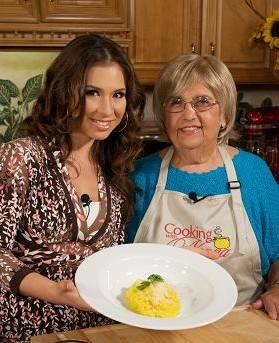




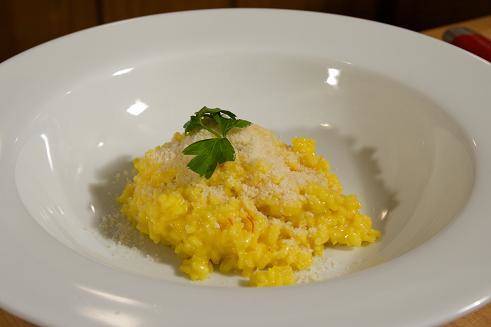
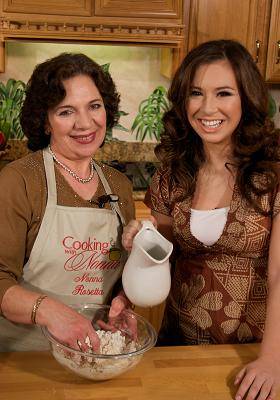
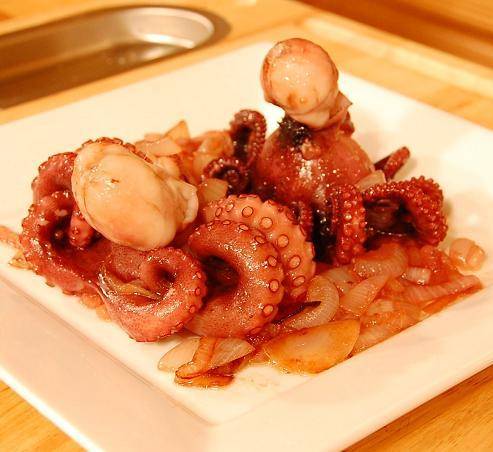

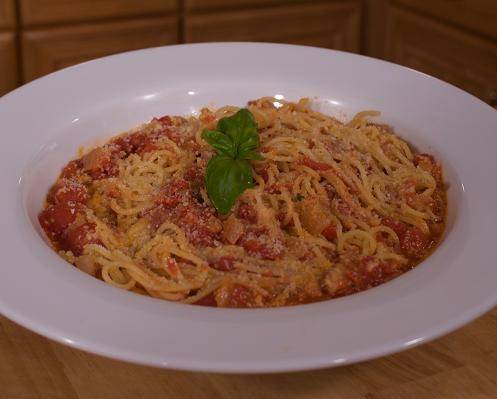



i-Italy
Facebook
Google+
This work may not be reproduced, in whole or in part, without prior written permission.
Questo lavoro non può essere riprodotto, in tutto o in parte, senza permesso scritto.